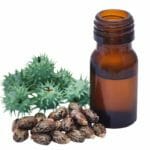Can you leave tea tree oil in your hair overnight?
At BeautyCaters, our expert team independently curates every recommended product. Purchases through our links may earn us a commission. Explore our transparent selection process.
Tea tree oil has gained popularity as a natural remedy for various hair concerns. But is it safe on scalp throughout night? Can you leave tea tree oil in your hair overnight? Let’s explore the benefits and potential risks of this practice.

What is tea tree oil?
A gentle yet powerful crucial oil, tea tree oil is prized for its multifaceted therapeutic properties. This oil is extracted from the leaves of the Melaleuca alternifolia tree, native to Australia. This versatile essential oil has gained popularity in various applications, including skincare, hair care, and aromatherapy.
Its refreshing scent and potential health benefits have made it a sought-after ingredient in numerous products. But do you know its benefits extend to hair care as well.
Composition of tea tree oil
The chemical composition of tea tree oil is essential to grasp its potential benefits for scalp health. It’s primary constituents, are terpinen-4-ol, gamma-terpinene, and alpha-terpinene, which work synergistically to combat common scalp issues.
These compounds contribute to tea tree oil’s:
- Antimicrobial properties: Helping to eliminate bacteria and fungi that can cause scalp infections.
- Anti-inflammatory effects: Soothing irritated and inflamed scalps.
- Penetration ability: Allowing the oil to reach the hair follicles for deeper nourishment.
Extraction of tea tree oil
Tea tree oil is extracted through steam distillation, preserves its potent compounds, including terpinen-4-ol, known for its antibacterial and antifungal actions. This natural process ensures the oil’s purity and efficacy.
Uses of tea tree oil
Tea tree oil has a rich history of use, dating back to Indigenous Australian practices. Today, its versatility has made it a popular ingredient in various hair care products. Beyond its medicinal applications, tea tree oil has proven effective in addressing common hair concerns.
- Scalp benefits: Effective in treating dandruff, itchiness, and other scalp issues.
- Hair health: Promotes a clean, soothed, and healthy scalp environment.
- Versatility: Addresses various hair concerns, including dryness, oiliness, and hair loss.
Also Read: Coconut oil or jojoba oil which is better for your hair?
Benefits of tea tree oil for hair

Tea tree oil can be a game changer for your hair health. Packed with numerous benefits it aid in maintaining the overall health of your hair and scalp. Here is the benefit you can draw from tea tree oil:
- Scalp health: Tea tree oil’s antimicrobial properties combat dandruff, a common scalp condition characterized by flaky skin and itchiness. By inhibiting the growth of the fungus responsible for dandruff, tea tree oil helps restore scalp balance and reduces discomfort.
- Hair growth: While there’s limited scientific evidence directly linking tea tree oil to hair growth, its ability to create a healthy scalp environment is crucial for optimal hair follicle function. A clean and nourished scalp can indirectly support hair growth by preventing factors that hinder hair development.
- Oil balance: Tea tree oil helps regulate sebum production, addressing both dry and oily scalp conditions. For those with oily scalps, it can help reduce excess oil without over-drying, while for dry scalps, it can provide essential moisture without clogging pores.
- Hair strength: By creating a healthy scalp environment, tea tree oil indirectly contributes to hair strength. A nourished scalp provides the foundation for strong, resilient hair follicles.
- Dandruff treatment: Scalp issues such as dandruff can be not only uncomfortable but also embarrassing. Tea tree oil’s natural properties fight off the microbes responsible for dandruff, effectively reducing flaking and itchiness.
Can you leave tea tree oil in your hair overnight?
Many people wonder about the practicality and safety of leaving tea tree oil in their hair overnight. Here is a detailed study.
Potential benefits of overnight use
The benefits of leaving tea tree oil in your hair overnight can be substantial. It may help address issues like dandruff, irritation, and scalp acne while deeply moisturizing your hair. Additionally, the continuous exposure allows for better absorption, potentially leading to improved scalp health and hair growth.
Risks and concerns of overnight use
Overnight use of tea tree oil does carry some risks. It is a potent necessary oil that can cause skin irritation or an allergic reaction in some individuals. If used undiluted, it may lead to dryness or sensitivity on your scalp. Always perform a patch test before widespread application.
Overnight exposure to tea tree oil can exacerbate these risks, especially if you have sensitive skin. If you experience any discomfort, such as itching, redness, or burning, it’s important to wash it out immediately and avoid future applications. Long-term exposure without proper dilution could lead to more serious skin reactions, making it crucial to ensure it is mixed with a carrier oil or conditioner.
Guidelines for safe overnight application
Application of tea tree oil overnight requires careful consideration. Ensure that you dilute the oil with a carrier oil, such as coconut or olive oil, to minimize the risk of irritation. A common recommendation is to mix a few drops of tea tree oil with a tablespoon of carrier oil.
Best carrier oils for tea tree oil hair treatments

- Olive oil and tea tree oil: This blend leverages the moisturizing properties of olive oil, rich in antioxidants, to nourish the scalp deeply. Tea tree oil complements this by helping to regulate sebum production and soothe irritation. Blend approximately ten drops of tea tree oil withtwotablespoons of olive oil. Gently warm the mixture before massaging it into your scalp and hair.
- Jojoba oil and tea tree oil: Jojoba oil’s similarity to the scalp’s natural sebum makes it an ideal base for this mixture. Combined with tea tree oil’s antibacterial actions, it helps maintain a clean scalp environment conducive to hair growth. Mix ten drops of tea tree oil with two tablespoons of jojoba oil. Apply the mixture to your scalp and leave it on for a while before rinsing.
- Lavender and tea tree oil: This combination offers a calming and restorative approach to hair care. Lavender oil’s soothing properties work in synergy with tea tree oil’s antimicrobial benefits to create a balanced scalp environment. Blend two to three drops of rosemary oil with tea tree oil and a carrier oil of your choice.
- Rosemary and tea tree oil: For those seeking to stimulate hair growth, this blend is ideal. Rosemary oil, known for its potential to thicken hair, is combined with tea tree oil to support overall scalp health and hair follicle strength. Blend two to three drops of rosemary oil with tea tree oil and a carrier oil of your choice.
Tea tree oil for all hair types
Types of hair can react differently to tea tree oil. Here’s a quick overview:
| Hair Type | Effectiveness |
| Straight | Balances oil production |
| Wavy | Reduces frizz |
| Curl | Moisturizes and nourishes |
| Kinky | Helps unclog pores and promote growth |
| Coily | Aids in scalp health |
Final Word: Can you leave tea tree oil in your hair overnight?
While tea tree oil offers numerous benefits for hair health when used correctly, it’s essential to use it judiciously. Leaving undiluted tea tree oil on your hair overnight can potentially irritate your scalp. However, when mixed with a carrier oil, it can be a safe and effective overnight treatment.
Remember: Always conduct a patch test before applying any new product to your skin. If you experience any adverse reactions, discontinue use. Consistent application of these DIY hair treatments, combined with a healthy diet and lifestyle, can contribute to visibly healthier, shinier hair.










